#making compost
Explore tagged Tumblr posts
Text
#composting#food scraps#making compost#living sustainably#making soil#making your own soil#i do mine in the community garden#but not professionally#just putting everything in a pile#and then 2 yrs later spreading it in the garden#it works excellently
42 notes
·
View notes
Text
Best Use Organic Fertilizers and It's 3 Benifits for Gardening
Organic fertilizers are derived from plant, animal or mineral resources and are used to improve the health and productivity of soil and plants. They are a major component of organic gardening and farming. The importance of organic fertilizers in gardening lies in their many benefits: 1. Supply of Nutrients: Organic fertilizers provide essential nutrients to plants, including nitrogen,…
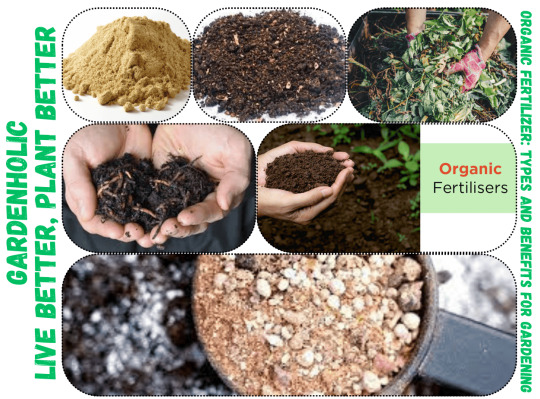
View On WordPress
#Animal-based fertilizers#essential nutrients#Green Manure#Improving soil quality#Making Compost#Mineral based fertilizers#natural fertilizers#organic fertilizer#organic fertilizers#Plant-based fertilizers#resources for gardeners#Supply of Nutrients#Uses of Compost
0 notes
Text

happy ending for broth boy
#mithrun#delicious in dungeon#dungeon meshi#dunmeshi#mithrun dungeon meshi#idk why I titled it like that#broth boy because senshi said leftovers make tasty broth and stuff#I didn’t want to call him compost boy ok
1K notes
·
View notes
Text
“When a fellow fairy dies, we plant a small ring of their favorite flowers and burry them in the middle. Once grass grows over the grave, we erect a special statue made from stone that honors something the deceased loved. We have a celebration when we raise the statues, feasting and dancing, all in the name of the fae who passed.”
“Whoa… that’s really thoughtful. You fairies love to be elaborate. Us borrowers have to be sneaky, we can’t have big funerals. And we don’t typically do burials, there’s no where to really burry people inside.”
“So, what does your kind do with their dead?”
“Garbage disposal, usually.”
#g/t#death mention#death tw#idk what other tws to put on this#ive made this joke before and ill make it again. its so funny to me#the inverse of this joke would be like. fae putting their dead in a compost bin.#get composted idiot
132 notes
·
View notes
Note
IMPORTANT QUESTION
My friends and I have started calling you the irl version of Lilia and we wished to know if you can cook because we are worried for the home if you cannot
(This is a light hearted joke)
I can (more or less) follow a recipe, which gives me the advantage! >:D ...although it is true then when left to my own devices I default to "dump in a bunch of random spices and see what happens". I...I just really like cayenne and turmeric okay --
other than that (and all the other many things that are different about us) Lilia and I are, y'know, basically identical.


#art#for a given definition of art anyway#twisted wonderland#it's canon that silver didn't know food could taste good until he came to nrc#if i remember right in his bloom birthday card lilia went on a long explanation about how he's been trying to cook healthy meals lately#(read: burned and yet somehow semi-raw vegetable mess that is basically already a compost heap)#and then at the end is like 'ha ha i don't eat the swill i make! that would be bad!'#'i just make everybody else eat it while i eat whatever'#sounds about right#i did once somehow manage to bake a cake for about 2 hours longer than it was supposed to bake for#and it was still underdone#it was a box mix so god only knows what happened there
1K notes
·
View notes
Text
Algae harvest from our well

A common practice in big scale agriculture is directly dumping fertilizers into irrigation water to save time and money. This water often filtrates into underground water reservoirs, filling it with nitrogen species that will be used by algae and other microbes. This process is called euthophication and it can be harmful to the intricate ecosystem inside a body of water, mainly by creating low oxygen conditions that will kill the previous inhabitants (though there are other factors at play). We cleaned the well and will be drying this algae to use it as fertilizers for the trees.
#using this creature saturday to educate yall#we make our own compost to avoid using inorganic fertilizers but we can never avoid Big Crop#there are no longer frogs living in the well and it makes me sad
23 notes
·
View notes
Note
What Is Vegan Leather Made Of? Many Plant Leathers Are Being Used (greenmatters.com)
Yes, plant leather is a great idea (not better than animal leather, in my personal opinion, but that's down to each individual's thoughts on the matter). But unfortunately much of it just can't replicate many of real leather's beneficial properties- and a lot of plant leathers heavily involve plastic in their production. (source)
Look, ALL clothing production needs to be more sustainable at this point. The chemicals involved in tanning actual leather, unless it's organic leather, aren't good for the environment either. And I will never rag on someone for their choice to avoid real leather- we're all just trying, I hope, to make the best choices according to our values and within the confines of a broken system (as long as we're not hurting anyone else). For me, the massive habitat loss and environmental destruction caused by plastics production and waste is a greater evil than the deaths of individual animals in the production of meat and/or leather. So I choose real leather and try to make each piece last as long as I can, aware that any choice I make will have environmental impacts and is not perfect. Someone else might see it differently, and I really am not in a position to judge their choices.
However.
The term "vegan leather" is blatant greenwashing, and 99% of the time it applies to plastic. If people prefer to wear plastic to avoid real leather, that's fine, but they- and moreover companies -need to be honest about that. Just like synthetic fabrics should be called plastic, so should synthetic leather. Even some of the allegedly "plant-based" stuff, it turns out.
I'm honest that my real leather is animal hide. Time for the faux-green fashion industry to display some honesty of its own.
#ask#moss-and-wildflowers#also obviously the meat and leather industry needs to be more humane#I'm not opposed to the use of animal products- they WILL eat us in some form one day after all -but they should be treated with respect#so that their lives- however short -are Good#now I AM pissed at the largescale framing of animal clothing products as Evil that drives up the price of wool and leather for#those of us who want it#newsflash: I live in Massachusetts. it's still cool or cold here most of the year. if I don't want to wear plastic there are no alternative#and yet because of misinformation by the likes of P*TA farmers are forced to compost their wool#because there's not much demand for it. making it nigh-impossible to get at reasonable prices
236 notes
·
View notes
Text
Went to a food distribution center, and they gave us. A whole chicken. So i cooked it up, and i picked that shit as clean as i could (my favorite activity) and made chicken broth, but uh. We dont have a container for liquids, so uhmmm.
The chicken broth goes in the square container!
#the circle.... goes in the square hole.#anyways i ordered groceries i cannot wait to have milk and eggs and butter i can make MEALS. I CAN BAKE#god i want chickens. so i can never run out of eggs#polterghost#evp#what do i do with these bones now. i could just toss them but what if i can get more out of them#i would compost or something but unfortunately this is not my house and i dont know if the landlord would be chill with me mulching his yard
44 notes
·
View notes
Text
Supporting Your Plants for Cheap
This is my fifth post in a series I'll be making on how to increase biodiversity on a budget! I’m not an expert--just an enthusiast--but I hope something you find here helps!
Once you start gardening, you’ll find a lot of things go into it, and it can be a bit daunting to think about--especially if you’re trying to keep things low-cost. Fortunately, it doesn’t have to be as hard--or as expensive--as it initially appears.
Composting
There’s several different ways to compost, any of which are helpful indirecting food waste and nutrients out of landfills and into your soil--which in and of itself can help increase biodiversity by making the space more livable for microorganisms and insects, which then cycles around to the rest of the habitat.
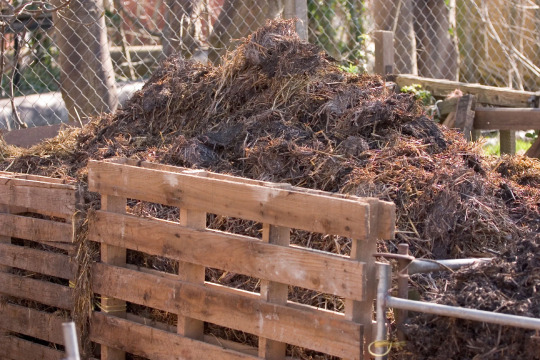
The classic one you see is hot composting. Most of the time, when I see hot composting set ups online, or hear people talking about them, it’s like listening to a wizard cast an intricate spell and prattle on about ratios and temperatures and special ingredients while standing over a detailed self-built setup made of the finest wood money can buy. Fortunately, it doesn’t have to be complicated. First off, there’s lots of ways to make compost bins--some can be more expensive than others, but there’s definitely options asides from buying pre-made tumblers or getting an engineering degree. I’ve seen people use metal trash cans dug into the ground, make compost pile setups out of old pallets, or just pile stuff up and leave it. While using different ratios of certain items can help them decompose faster, it’s ultimately not something you need to worry about a lot. If it can break down, it’ll break down--it just might take awhile. Composting this way can also help provide habitat--some insects like bumblebees have been known to make nests in compost heaps. In addition, it provides a robust ecosystem for decomposers like worms and other organisms, and bats and birds will be attracted to open-top piles to eat flying bugs that live off the compost. Amphibians enjoy them for humidity, warmth, and feasting on insects. Do note that sometimes snakes may also rest in and lay eggs in compost heaps, so be careful when turning them.
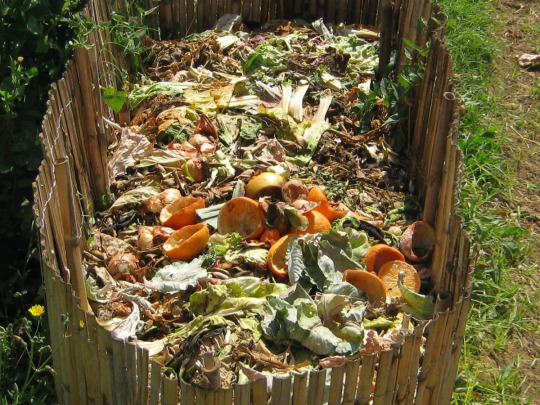
Do note, though, that if your compost pile looks like that you're getting roaches and rats and raccoons out of your goddamn mind. Bury the food scraps.
Personally, when I compost, I use a worm bin--they’re a fantastic option for limited space and limiting smells. I keep mine outside in a big rubbermaid tote with holes drilled into the bottom, sides, and lid. I put a layer or two of weed block on the inside, so it’s still able to drain but keeps the worms from trying to escape during rainy days. There is an initial cost of buying the worms, getting enough bedding materials, and getting a new bin if you don’t have an old one suitable for use. But with occasional feeding, it should sustain itself and provide valuable worm castings that can be used in the garden. Please do note, however, that earthworms are considered invasive in some places.

Look at that worm bin-y goodness. This is a pic of my bin, from earlier this month!
Though I’ve never done it, I’ve heard of people having good results with bokashi composting--a method that’s done in a bucket, and is relatively easy to do indoors.

Once you start a composting system, keeping it stockpiled with organic material can become pretty easy for cheap. In general, if it comes from a plant, it’s safe to use. It’s also a good idea to avoid putting already-cooked things in a pile, as salts and sauces can kill beneficial bacteria in the compost while also attracting animals. Adding meat is also generally avoided to not attract animals. But below are some things that I’ve put in my worm bin quick, easy, and cheaply; or things I’ve seen friends put in their compost piles.
Cooking scraps/snack leftovers--things like cut up bell peppers, the ends of tomatoes, strawberry tops, apple cores, watermelon rinds, coffee grounds, and orange peels are amassed somewhat quickly in my house--my dad likes to cook. Around holidays like Thanksgiving and Christmas? Corn husks, potato peels, sweet potato fibers, leftover greens and other trimmings are a feast for compost piles and worm bins.
Vegetables and Stuff that went bad in the fridge/pantry--we’re constantly victims of the ‘forgot it was there’ conundrum. Fridge cleanouts are great times to decide what can be tossed to the compost--moldy bell peppers, spotty celery, questionable carrots, onion halves, old eggs, bagged salads, and stale/moldy bread have all been tossed into the pile before!
Grass clippings--though my worms don’t like grass clippings, they’re still great material for a classic hot compost set-up!
Fallen leaves--another classic addition to a hot compost pile. Some friends keep them stocked up and stored for later use.
Plant trimmings--what is plant clean up if not compost material? I’ve put cleaned-out sunflower heads and stalks in my worm bin, and they decomposed after about two months. If you get blossom end rot on your tomatoes or peppers, they’re still fair game for the bin as well!
Shredded mail--just make sure to not put in the thin plastic that covers the address section on some envelopes. Otherwise? As long as the paper isn’t glossy, it should be great for a bin or pile! Shredded paper or cardboard also makes great bedding for worm bins. Put those Amazon boxes to good use!
Pumpkins! Snag your neighbor’s halloween pumpkins in November and toss them in my compost! Last year my dad went around the cul-de-sac and nabbed all of the post-halloween pumpkins, the worms loved it.
Christmas tree needles--can’t confirm I’ve tried this, but it seems like it would work.
Mulch
Mulch is an excellent way to keep your soil moist, while also beginning and continuing to improve soil conditions as it breaks down into organic matter. You’ll have to water less, and it’ll prevent/slow down the growth of unwanted weeds (which is always the final straw to gardening for me, I get so overwhelmed I just stop going outside). Win-win situation, right? Except stepping into a Home Depot and finding mulch being sold for five dollars per square foot and knowing you have to cover a whole garden with it all can add up… pretty quickly, to say the least.
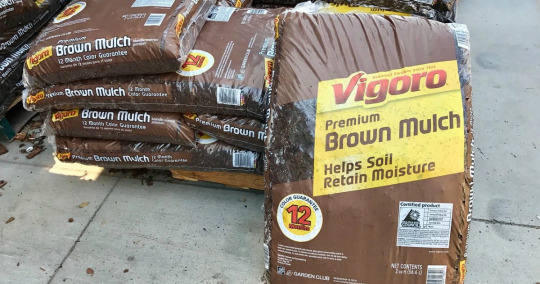
Fortunately, there are a few solutions to this, and likely from your own backyard!
Grass clippings are the first that come to mind. If you’re mowing your lawn, or have neighbors who are, collecting the clippings and spreading them over your soil is a cheap and easy option for some quick mulch. It’ll be very nitrogen-heavy, so keep that in mind, but it’ll still prevent weeds, retain moisture, and break down into organic material over the course of a few months. Do try to not use grass clippings you know are treated with pesticides, since the aim is to use this mulch to help increase your biodiversity, and having insects around plays a big role in that.

Fallen leaves are the next that comes to mind. If you’ve got a tree in your yard, or in your neighborhood, then you or someone around you knows the neverending avalanche of leaves or pine needles that drop come fall. As mentioned before, they can be used to make brush piles for creatures, or added into compost, but they have a fantastic third use as mulch. Add them on top of your beds!
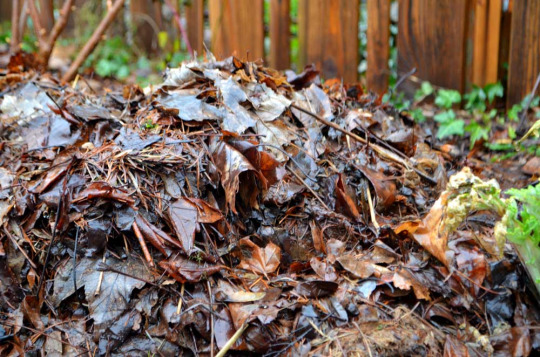
Want free wood mulch? A program called Chip Drop might be the best solution for you! They team up with arborists to find cheap drop sites for shredded wood, logs, etc. that are produced as they maintain trees! If any local arborists tied to the program are operating in your area, instead of paying to dump the resulting mulch at a landfill or some other dumpside, they’ll simply dump it at your place! Now, you won’t be able to control when the mulch gets dropped--I’ve heard of people coming home from work one day to find a chip drop in their driveway. But… free mulch!
Want wood chips but not a whole truck load? If an arborist is working in your area, and you can muster the courage, its worth a shot to ask! One time someone in my neighborhood was getting a tree removed, so my Dad and I parked near their car with a tarp in the trunk, some shovels, and an old storage bin. We approached nicely and asked if we could have some chips, and they were totally cool with it! At that point, how much you get depends on how big your trunk space is, and how many times you’re willing to ferry mulch back and forth out of your car so you can go back for more. But it is an option! Alternatively, you can ask them to dump the whole load in front of your house, but at least you’ll know when and where it’s happening!
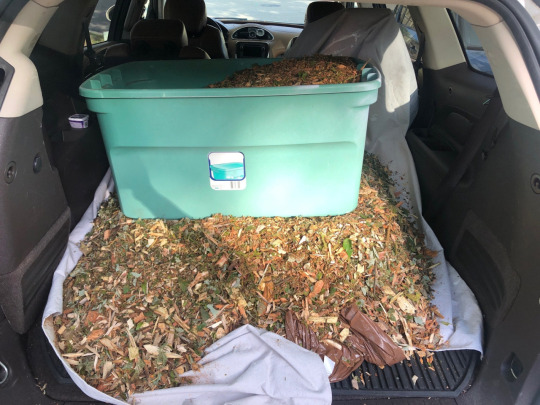
Trellises
Many plants need, or will appreciate, some kind of climbing structure. But trellises aren’t often cheap to find. To that, I say--we’ll create our own!

One popular option is to grow taller plants, and then plant climbing species are few weeks/years later so they’ll climb the taller plants! I’ve planted passion vine near a tree in my garden for it to climb, and I’ve seen people do similar concepts with sunflowers, corn, and other such plants! Sunflower stalks can provide support even after they’ve been cut back.
A combination of wood, some stakes, some nails, and some string can create a great frame trellis that can be used for beans, tomatoes, vines, etc--so I’m sure if could be put to good use for native climbers, especially since my dad’s used this structure for passion vines before. You may have to replace the string every year, but most of the time, the string is compostable anyways!
This may take a bit more setup and have a more upfront cost, but creating a trellis out of cattle panels makes a durable structure that can support all kinds of vining plants!
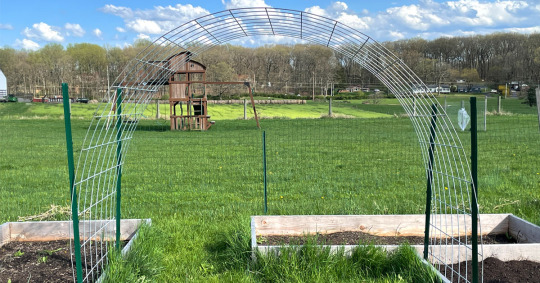
Of course, there’s always the easy alternative of simply letting plants climb along your fence! This is especially easy if you have a chain link fence, but wooden fences are plenty suitable for some species as well! I’ve seen passion vines do great growing along chain link fences as supports, and one of my favorite sights as a kid was always seeing bushels of trumpet vines growing up and over fences on the drive home.
Why are we worrying about trellises? Creatures are attracted to diverse landscapes with a variety of plants within them, so having a few climbers can be a great way to attract more wildlife! I know some plants in my area that pollinators are attracted to, or even rely on as host plants, are climbers that can get upwards of 15 feet tall, and will climb any surface you give them. A trellis provides you a great place to put extremely beneficial plants.
That's the end of this post! My next post is gonna be about how different 'kinds' of plants can all be beneficial in a biodiversity standpoint. Until then, I hope this advice was helpful! Feel free to reply with any questions, your success stories, or anything you think I may have forgotten to add in!
#biodiversity#solarpunk#gardening#outdoor gardening#composting#mulch#trellis#budget gardening#cheap gardening#ani rambles#out of queue#the biodiversity saga#i remember junior year of college me and my friends considered doing a cattle panel trellis#but then we couldn't figure out where to buy cattle panel#apparently the answer is 'tractor/farmer supply companies'#also so anyone reading these tags knows what took me 5+ years to learn#CATTLE PANEL DOESNT COME IN ROLLS IT COMES IN LENGTHS#all this time I was like 'man i wanna make a cattle panel trellis but it comes in like 40 foot lengths and i dont need that much'#and all my gardening homies were confused because theyve been getting it in lengths THIS WHOLE TIME#I WAS LOOKING AT FUCKIN ROLLED FENCING#i actually dont think any of the big box stores by me even fuckin sell cattle panel but thats beside the point#you can get it delivered though#(Delivered to the store for pickup i think)#someday i want a cattle panel trellis with like moonflowers or trumpet vine just a BURST of color and life
309 notes
·
View notes
Text
A wizard that uses a stiffen and harden spell on his earthworm familiar to use it as his magic staff. He turns it to have its mouth face the ground and he automatically gains an immense burrowing speed, plus a fantastic source of nutrient rich fertilizer.
#wizard#wizardposting#wizard shit#wizardblogging#wizardblr#d&d#dnd#familiar#worms#earthworm#make up a guy#character idea#composting
180 notes
·
View notes
Text
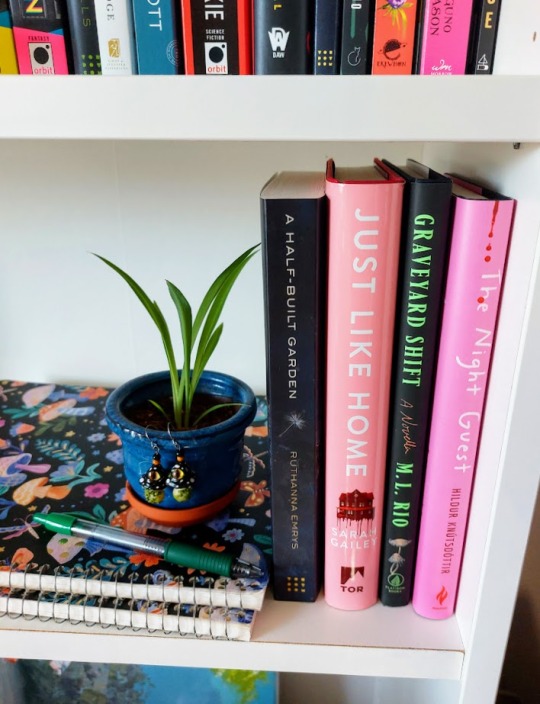
Books of 2024: November Wrap-Up.
Hi, y'all! I'm actually shocked that I managed to get through four (4) books this month, because it was NANO and I also WROTE A WHOLE BOOK!! The (written) book in its two notebooks is pictured beneath the pen and NaNo Earrings :)
All of these reads were NaNo-adjacent, somehow (I like to stack my reading with my writing project so all the Vibes are Correct)--either Space, or Haunted, or Fucked Up Fungi (I wrote a weird book this month)(I had a great time).
Photos and/or reviews linked:
A HALF-BUILT GARDEN - ★★★½ I enjoyed this! It was very slow and contemplative, and I was surprised by how long it took me to read (#NaNoProblems), but I'm glad I did, and Rhamnetin was a DELIGHT.
JUST LIKE HOME - ★★★★ Reread for me, holds up very well! Star rating unchanged from first time through. I actually do recommend rereading this one, knowing exactly when Daphne dies.
GRAVEYARD SHIFT - ★★★½ I enjoyed this one too! Short fun weird little insomnia romp. Love a good fucked up fungus and a motley POV crew.
THE NIGHT GUEST - ★★★★ This was DEEPLY fucked up and AMAZINGLY crafted horror/suspense, and I definitely had delayed nightmares about it. I also love a good spec fic in translation (this one's from Icelandic!). Cats are NOT safe, very graphically so, so proceed with caution if that's a warning you need.
Under the Cut: A Note About ~*★Stars★*~
Historically, I have been Very Bad™ about assigning things Star Ratings, because it's so Vibes Heavy for me and therefore Contingent Upon my Whims. (Example: I don't like that stars are Odd, because that makes three the midpoint and things are rarely so truly mid for me)(I have hacked my way around this with a ½). Here is, generally, how I conceptualize stars:
★ - This was Bad. I would actively recommend that you do NOT read this one, no redeeming qualities whatsoever, not worth the slog. Save Yourself, It's Too Late For Me. Book goes in the garbage (donate bin).
★★ - This was Not Good. I would not recommend it, but it wasn't a total waste or wash--something in here held my interest/kept my attention/sparked some joy. I will not be rereading this ever. Save Yourself (Or Join Me In Suffering, That Seems Like A Cool Bonding Activity).
★★★ - This was Good/Fine/Okay/Meh. I don't care about this enough to recommend it one way or another. Perfectly serviceable book, held my interest, I probably enjoyed myself (or at least didn't actively loathe the reading). I don't have especially strong feelings. You probably don't need to save yourself from this one--if it sounds like your jam, give it a shot! Just didn't resonate with me particularly powerfully. I probably won't reread this unless I'm after something in particular.
★★★½ - I liked this! I'll probably recommend it if I know it matches someone's vibes or specific requests, but I didn't commit to a star rating on Goodreads. More likely to reread, but not guaranteed.
★★★★ - I really enjoyed this!! I would recommend it (sometimes with caveats about content warnings or such--I tend to like weird fucked up funny shit, and I don't have many hard readerly NO's). Not a perfect book for me by any means, but Very Good. This is something I would reread! Join me!!
★★★★★ - I LOVED THE SHIT OUT OF THIS, IT REWIRED MY BRAIN, WILL RECOMMEND TO ANYONE AND EVERYONE AT THE SLIGHTEST PROVOCATION (content warning caveats still apply--see 4-star disclaimer). Excellent book, I'll reread it regularly, I'll buy copies for all my friends, I'll try to convince all of Booklr to read it, PLEASE join me!!
#books of 2024#books of 2024: november wrap-up#a half-built garden#ruthanna emrys#just like home#sarah gailey#graveyard shift#m.l. rio#the night guest#hildur knutsdottir#did i mention that i WROTE A WHOLE BOOK??#okay well like. a Compost Draft book lol. a Rotting Slough Of Good Ideas Book (affectionate)#i had a Revelation this year about my prep process and why my last four years have felt so rushed (spoiler: the root cause is LIVING HERE)#BUT! it's because i thrive on two (2) months of prep#it shakes out to like a month of brainstorming and then a month of carding/plotting/prewriting i think#but i've been speedrunning books since. 2021. which. was fine that year#because i set out to make a mess in a month (and it was a retelling)#fine in 2022 because that was self-indulgent crossover no plot or worldbuilding required#NOT fine in 2023 because i had an Actual Book i wanted to do and i rushed the prep and then i was grumpy#because i assumed i was writing a first draft but it was more like a compost draft#but not recognizing that made it not fun#THIS year i FINALLY understood what people mean when they say 'draft zero' (which does not work for me. because a draft on page exists/not0#and i realized i was basically doing that--halfway writing a book and halfway brainstorming on page#but KNOWING that fixed me because it Freed Me lol. so i think of this as compost draft#(appropriate for fungus book)#it's a full mess but it's MY mess and there's some good stuff in there#but for it (like for 2021 which i also knew). i will have to literally rewrite the book from the ground up#to make it a First Draft#i did not intentionally set out to do this with last year's so it wasn't fun :(#BUT I HAD FUN THIS YEAR THIS'LL BE A NEAT BOOK WHEN IT'S LEGIBLE
19 notes
·
View notes
Text
look at my grub boy

i am in love with @/beelz-bub’s scrubby he’s so uggo mode but in a cute way like a wrinkly dog i wanna hydraulic press him
#i will feed him the compost from my garden#here king egg shells and banana just for you <3/j#he’s so nasty lookin#sir !!!! do you even know where you are !!!! you are three#he makes me feel violent <3/hj#scarab#fionna and cake#at:f&c#my art#i’m going to draw him more probably#i love him
71 notes
·
View notes
Text
https://ejglamos.etsy.com
#crafts #ejglamos #etsyshop #onlineshop #garden #outdoorliving #woodwork #coasters #woodcraft #wire #gardening #shooks #s-hooks #plants #horticulture #greenhouses #gardencenter #lawnand garden #patio #landscaping #outerspace #bitcoin #blockchain #fintech #ethereum #shib #landscapestaples #tomatocages #tomatosupports #crafting #planthangers #spiralplantsupports #crypto #bitcoin #ethereum #conservatories #arboretum #vegetables #flowers #luxury #seeds #nursuries #trees #planting #jardineria #plantas #flores #lasestacasdejardin #alambre #madera #soil #compost #tierra #antarctica #botanic #botanicalgardens #jardinbotanica #mulch #sand #space #spacefood #outerspacegardens #terraforming #walledgardens#hydroponics #planting #lawn #lawncare #baskethangers #grass #semillas #outdoors #nursery #balcony #food #mulch #grass #lawns #birds #birding #organicgardening #plantstakes #birdfeeder #aquaponics #nature
#ejglamos#garden#crafts#etsystore#gardening#outdoorliving#planting#halloween#aesthetic#plants#astronomy#etsysmallbusiness#ebaystore#botanical#seasons#mushrooms#home decor#trains#outer space gardens#antarctica#manufacturer#artisan#arts and crafters#compost#soil making#soil#growing#planting seeds#lawn & garden#garden center
9 notes
·
View notes
Text
why is alan so malewife material

#smiling friends#smiling friends alan#i am going insane#i am going insane over this character#this guy is literally the least talkative in the group and sprays a homeless guy with dirty brown wah-ter#im going feral#he washes dishes#he makes compost#he def cooks#I DUNNO IF HE COOKS BUT I BELIEVE HE DOES#i'll give him all the cheese he wants
34 notes
·
View notes
Text
I just fell down a rabbit hole about (legal) body disposal and part of me is so anxious wishing I could tell the FBI agent monitoring my internet searches that I’m just morbidly curious and I’m not planning on dying anytime soon (or planning anything ELSE, for that matter)
#I swear I’m innocent#I just didn’t know there were multiple types of cremation#and then I got curious about other legal burial/body disposal methods#and then I learned that you can have your ashes basically made into a starter reef in the ocean????#THERE HAVE BEEN SO MANY ADVANCEMENTS IN BODY DISPOSAL AND PREP GUYS ITS KINDA INSANE#YOU CAN MAKE YOUR BODY INTO SOIL!! which seems like it would be easy but apparently it’s a rather new advancement!!#and I mean like proper soil not just like. decomposed and mushed up remains I mean like Actual Human Compost#hi I’ve always been interested in morbid topics I swear#I’m not insane I just love the art of the funeral and the way we honor the dead#I always thought I wanted to donate my body to the army to have them drop my remains out of a plane#but uh… becoming part of the coral reef and helping sustain the reefs is definitely a more appealing option now#and like I always knew you could do the become a tree thing but there’s more options for that too!!#also there’s multiple ways to cremate and two of the three that I’ve researched don’t use an incinerator!!#they use a mix of water and highly alkaline chemicals?? which is so cool?? I thought the only way to get ashes from a body was to burn it#but apparently not!!#dude. science is so fucking cool#mortuary science is so fucking cool specifically#alright to the FBI agent assigned to me: sorry if I’m flagging shit with these searches I’m trying to keep the wording respectful#and non-incriminating lmaoooo#MelloMoans#mortuary science#morbid curiosity#funeral services#I guess??
14 notes
·
View notes
Text
WE GOT TURTLE BEANS AND LOVES LIES BLEEDING IN THE GARDEN FOLKS
#i really wish the root veggies had taken but it's prolly gonna be a while of topsoil building before that's viable in ground#meantime gonna have to be happy with the kales kicking up over winter and hopefully#the cardoon and blackberry bushes will mature by next fall#if the amaranth can do the same and we can collect some black beans to dry before winter fully sets in#we'll be good to go#god we're so close.......#i wonder how I would make large gardening sacks for roots. maybe course-weave muslin canvas? i could see if someone will sell me a full bolt#then i could make some sack cloth garden beds for roots to bury in compose for topsoil#the fabric can decompose with the compost and in the meanwhile will contain the soil inside enough to establish some root sets
7 notes
·
View notes